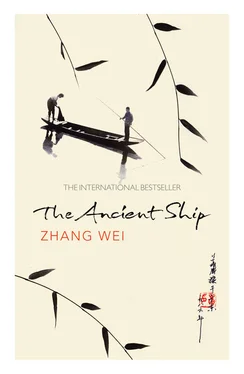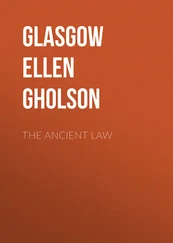If there was a more immediate cause for the earth to move, the blame should rest with the drilling rigs out in the fields. For the better part of a year a surveying team had been far from town. But soon the rigs came so close that the residents grew uneasy. Among them, only the lean figure of Sui Buzhao was seen around the rigs, sometimes helping to carry the drills and winding up mud-soaked from head to toe. “These are for coal mining,” he said to the gathered crowd. Day and night the drills turned, until the tenth day, when one of the town’s residents stood up and said, “That’s enough!”
“How do you know that’s enough?” the operator asked.
“When you reach the eighteenth layer of heaven and earth, we’re done for!”
The operator laughed as he tried to explain away their concerns. And the drills kept turning, until the morning of the fifteenth day, when the earth began to move.
People flew out of their windows. The rolling of the ground sickened them and made them dizzy. All but Sui Buzhao, who had spent half his life on ships and easily adapted to the pitching and rolling of the earth beneath him. He ran fast, but then a thunderous roar rose up from somewhere and froze people where they stood. When they regained their bearings, they ran madly to a vacant lot, where they huddled with the crowds already there. The lot was what was left of the old temple that had burned down. Most residents of the town were there, and they were shivering, even though it was not a cold morning. The sound of their voices changed—they spoke listlessly, feebly, and even the fastest-talking among them stammered. “What has fallen?” they wondered. No one knew; they shook their heads.
Many hadn’t had time to dress, so now they frantically covered their bodies. Sui Buzhao was naked but for a white shirt tied around his waist. He ran around looking for his nephews Baopu and Jiansu and his niece Hanzhang, whom he found under a haystack. Baopu was dressed—more or less—while Hanzhang had on only bra and panties. Crouching inside, her arms crossed over her chest, she was shielded by Baopu and Jiansu, who was wearing only a pair of shorts. Sui Buzhao crouched down and looked for Hanzhang in the darkness. “Are you okay?” he asked.
“Yes,” she replied.
Jiansu edged closer to her. “Go away!” he said impatiently.
So Sui Buzhao walked around the square and discovered that the clans were all huddling together; wherever you saw a group of people, you found a clan. Three large clusters: Sui, Zhao, and Li, old and young. No one had called them together—the ground had done that; three shakes here and two there, and the clans were drawn to the same spots. Sui Buzhao walked up to where the Zhao clan had gathered. He looked but did not see Naonao anywhere. What a shame that was. Naonao, barely twenty, was the Zhao clan’s favorite daughter, a young woman whose beauty was spoken of on both sides of the river. She burned through the town like a fireball. The old man coughed and threaded his way in among the crowd, unsure which clan he should go to.
The sky was turning light. “Our wall is gone!” someone shouted. And that is when the people understood the origin of the thunderous roar. With a chorus of shouts, they ran, until a young man jumped up onto the abandoned foundation and shouted, “Stop right there!” They looked up at him, wondering what was wrong. He thrust out his right arm and said, “Fellow townspeople, do not move. This is an earthquake, and there will be an aftershock. Wait till it passes.”
The people held their breath as they listened to what he was saying. Then they exhaled as one.
“The aftershock is usually worse than the first shaking,” he added.
A murmur rose from the crowd. Sui Buzhao, who was listening intently, yelled, “Do as he says, he knows what he’s talking about!”
Finally the square was quiet. No one moved as they waited for the aftershock. Many minutes passed before someone in the Zhao clan yelled tearfully, “Oh, no, Fourth Master didn’t make it out!”
Chaos ensued, until another older resident cursed hoarsely, and everyone realized it was Zhao Duoduo. “What the hell good does all that shouting do? Go get Fourth Master and carry him over here!” Immediately a man broke from the crowd and ran like the wind down a lane.
No one in the square said a word; the silence was unnerving and stayed that way until the man returned.
“Fourth Master was asleep!” he announced loudly. “He says everyone should go back to their homes, that there won’t be an aftershock.”
The news was met with whoops of joy. Then the elders of each clan told their young to head back home. The crowds dispersed as the young man jumped down from the foundation and walked off slowly.
Three people remained in the haystack: Baopu and his brother and sister. Jiansu stared off into the distance and complained, “Fourth Master has become a sort of god, reigning over heaven and earth!” Baopu picked up the pipe his brother had laid on the ground, turned it over in his hand, and put it back. Straightening up to free his muscular body from its confinement, he looked up at the fading stars and sighed. After taking off his shirt and wrapping it around his sister’s shoulders, he paused and then walked off without a word.
Baopu entered the shadow of a section of collapsed wall, where he spotted something white. He stepped forward and stopped. It was a half-naked young woman. She giggled when she saw who it was. Baopu’s throat burned. A single tremulous word emerged: “Naonao.” She giggled again, set her fair-skinned legs in motion, and ran off.
The Sui clan and the old mills, it appeared, were fated to be linked. For generations the extended clan had produced glass noodles. As soon as the three siblings—Baopu, Jiansu, and Hanzhang—were able to work, they could always be found on the sun-drenched drying floor or in the steamy processing rooms. During the famine years, of course, no noodles were produced, but once the millstones were turning again, the Sui clan was back at work. Baopu was happiest when things were quiet. Over the years he had preferred to sit on a stool and watch the millstone turn. Since it was Jiansu’s job to deliver the noodles, he spent most of his time riding the horse cart down the gravel road all the way to the ocean piers; Hanzhang had the most enviable job: She spent her days on the drying floor, a white kerchief tied around her head as she moved amid the silvery glass noodles.
But now the factory had been taken over by Zhao Duoduo, who called his workers together on his first day. “I am responsible for the factory,” he announced, “and I invite you all to stay on. Those who wish to leave may do so. If you stay, be prepared to join me in days of hard work!” Several of the workers were off as soon as he was finished. But not Baopu and his siblings, who left the meeting and went directly to their posts. The thought of leaving the business never crossed their minds, as if it was what they were destined to do, a job only death could force them to leave. Baopu sat alone in the mill, adding mung beans to the eye of the millstone, his broad back facing the door, the room’s sole window high on the wall to his right. The view out that little window was of the riverbank, the scattered “fortresses” and the lines of willow trees. Farther off was an expanse of silver under a blue sky. That was the drying floor, a place where the sunlight seemed brighter than anywhere else and where the wind was gentler. Faint sounds of laughter and singing drifted over from the sandy ground, where young women weaved in and out among a forest of drying racks. Hanzhang was one of them, and so was Naonao. Children lay on the ground around the drying racks waiting for lengths of glass noodles to fall to the ground, so they could run over and scoop them up. Baopu could not see their faces through his window, but he could sense their happiness.
Читать дальше












